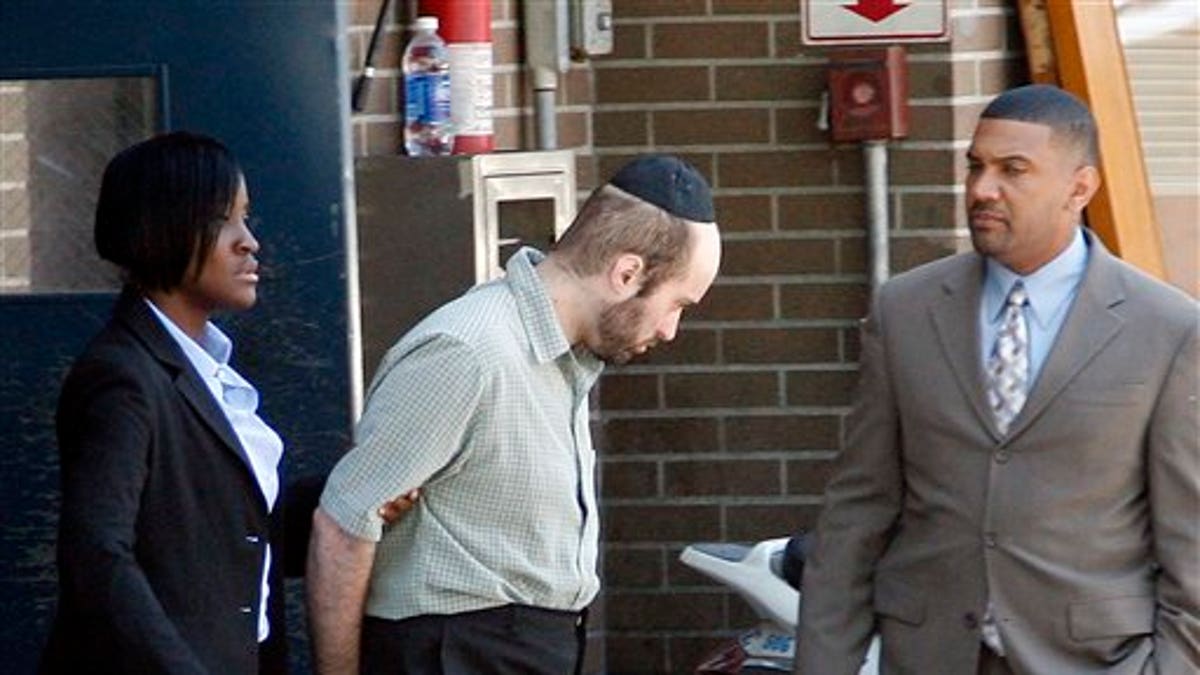
July 14: Detectives walk Levi Aron, center, to a police car at a Brooklyn precinct. (AP)
NEW YORK – A man charged with killing and dismembering an 8-year-old boy is confused and apathetic, a "practically blank" personality whose younger sister died while institutionalized with schizophrenia, according to a psychiatric evaluation obtained Wednesday by The Associated Press.
The court-ordered evaluation of Levi Aron found him fit to stand trial on murder charges in the death of Leiby Kletzky. Details in the report from a psychiatrist and psychologist at Kings County Hospital show the 35-year-old suspect is deeply troubled, and has given authorities conflicting accounts of his life and his mental and physical history.
A psychologist diagnosed him with an adjustment disorder and a personality disorder with schizoid features.
Schizophrenia is a mental disorder characterized by disintegration of thought processes and diminished emotional responsiveness. A person is more likely to have it if a close family member, such as his sister who died, has it.
"His mood is neutral, practically blank," the psychologist wrote. "The only time he seems to show any emotional response is when he is asked difficult questions about the reason for his incarceration."
The evaluation offers little details on a possible motive and does not delve much into the crime. Aron admitted knowing the charges against him are serious, and acknowledged that people are angry with him.
"He states he did not wish the boy harm but that he 'panicked,'" the psychologist wrote.
Aron, 35, has pleaded not guilty to murder and kidnapping in the death of Leiby, who got lost walking home from a Brooklyn religious day camp on July 11. The boy's severed feet were found in Aron's refrigerator, the rest of the body was discovered in pieces in a suitcase elsewhere in Brooklyn.
During the evaluation, Aron, dressed in regulation pajamas and "well-groomed," gave conflicting accounts of most details of his life, including how many siblings he has and whether he sought mental health care previously. He said he suffered a head injury as a child, though it wasn't clear exactly when.
"Mr. Aron is unable (unwilling?) to state categorically whether or not he was in prior psychiatric treatment," the psychologist wrote.
Aron also was unclear about the voices he says he heard during and after the boy's death. He said he doesn't remember anything stressful happening when he began to hear the voice.
"He admitted to us that he began to hear a voice talking to him approximately one year ago, but cannot make out what it says," according to the psychiatrist, who had recommended Aron remain at Bellevue Hospital. A judge disagreed and Aron is now being held without bail at a medical wing at Riker's Island in solitary confinement.
"He says he was too embarrassed to mention it to anyone," the report said.
Aron told the psychologist the voice does not command him to do anything, but he told doctors after his arrest that the voice commanded him to hurt himself and others, according to the records.
The psychiatric evaluation was ordered specifically to determine whether Aron would be fit for trial. The Brooklyn District Attorney's office had no comment.
Aron's lawyer, Pierre Bazile, said the records obtained by the AP were accurate.
"The evaluators agreed with us that Mr. Aron suffers from some psychiatric disorders and right now we are investigating whether or not his disorders are sufficient to meet the not guilty by reason of mental disease or mental defect threshold," he said.
The records filled in a few blanks about Aron's life, which was lived mostly alone except for a few impulsive decisions, such as moving to Memphis to get married to a woman he met online and had met in person only twice. They divorced after a few years. Aron was employed as a hardware clerk, and earlier as a supermarket worker and a caterer.
Aron spent much of his time online, and made a lot of audio and video recordings of himself doing karaoke. He lived alone in a home owned by his father and step mother, his brother lived in a separate apartment. His mother died about seven years ago.
Both the psychiatrist and psychologist described Aron as reserved, apathetic, sad and cooperative.
"He did report having nightmares since the incident which led to his arrest and having difficulty 'realizing what happened,'" the psychologist wrote
Leiby, lost walking home from camp, met Aron on the street and asked for help, prosecutors said. It was the first time the little boy was allowed to walk alone, and he was supposed to travel about seven blocks to meet his mother but missed a turn.
The boy first asked for a ride to a bookstore. But "on the way, he changed his mind and wasn't sure he wanted to go," Aron wrote in his confession, according court papers. Aron decided to take the boy to a wedding upstate and, when they returned, they watched television before the boy fell asleep, police said. He remained there the next day while Aron went to work, authorities said.
By that time, the disappearance had sparked a major search effort in his insular community in Borough Park. The boy's picture was plastered on light posts around the area. Aron panicked, according to court documents, and smothered the boy.
The detectives' notes also outline alleged statement by Aron about how he carved up the body with knives and disposed of body parts, including the severed feet found wrapped in plastic his freezer. A cutting board and three bloody carving knives were found in the refrigerator.
The medical examiner's office said the boy was given a cocktail of prescription drugs. But Aron's confession didn't mention that, and he denied ever tying up the boy, though marks were found on his body.
A pretrial hearing is set for Oct. 14.

